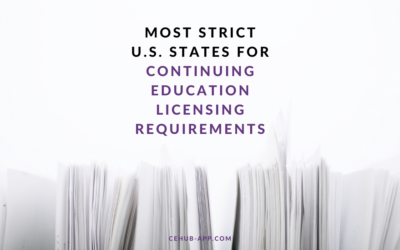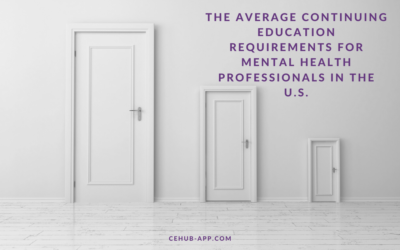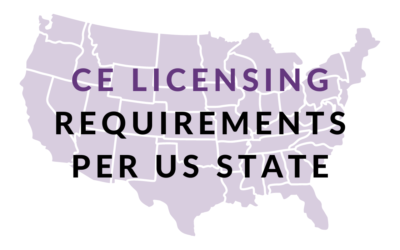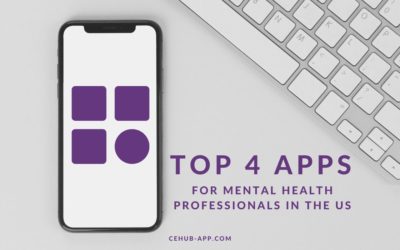Every state has their own CE topics for mental health professionals and licensing requirements for psychologists, marriage and family therapists, licensed clinical social workers, and licensed professional counselors. Some states have requirements that are completely unique to them, while other requirements are commonly shared. Certain hour requirements are shared across many license types and states, and certain topic requirements are commonly shared as well.
Let’s dive into the CE topics for mental health professionals that are the most common for each license type, as well as the most common hour requirement for each topic.
Psychologists
When we looked at the continuing education requirements throughout the United States, we researched all of the requirements for each state (as well as Washington D.C.). With a total of 51 sets of requirements, the most common topic required for psychologists is shared throughout 34 states (Washington D.C. is included in that count). Each of those states require some type of ethics education, with ranging hour quantities. The most common hour requirement for that topic is three hours every two years (shared among 14 states). The next most common topic requirement is suicide prevention with six states sharing that topic requirement in some capacity.
States sharing the ethics requirement: Arizona, Florida, Georgia, Idaho, Illinois, Indiana, Kansas, Kentucky, Louisiana, Maine, Michigan, Mississippi, Missouri, Montana, Nebraska, Nevada, New Hampshire, New Mexico, North Carolina, North Dakota, Ohio, Oklahoma, Oregon, Pennsylvania, South Dakota, Tennessee, Texas, Utah, Vermont, Virginia, Washington, Washington D.C., West Virginia and Wisconsin.
Marriage and Family Therapists (MFTs)
The next license type we researched continuing education requirements for is MFTs. When it comes to the requirements throughout the U.S. for MFTs, ethics is the most common topic requirement again, with even more states maintaining that standard – 38 total. While MFTs share the most common topic requirement with psychologists, the hour requirement that occurs most frequently throughout the country is six hours across 15 states. The second most common topic requirement for MFTs is also suicide prevention with seven states requiring it.
States sharing the ethics requirement: Alabama, Alaska, Arizona, Arkansas, California, Florida, Idaho, Indiana, Iowa, Kansas, Kentucky, Louisiana, Maine, Mississippi, Nebraska, Nevada, New Hampshire, New Jersey, New Mexico, North Carolina, North Dakota, Ohio, Oklahoma, Oregon, Pennsylvania, South Carolina, South Dakota, Tennessee, Texas, Utah, Vermont, Virginia, Washington, Washington D.C., West Virginia, Wisconsin, and Wyoming.
Licensed Clinical Social Workers (LCSWs)
You might be noticing a trend at this point, and that trend is certainly going to continue when it comes to the most common topic requirement for LCSWs in the U.S. Many LCSWs are also held to the expectation that they will refresh their ethics expertise, with 39 states all expecting continued ethics education. Of the 39 that expect ethics education, 13 states require at least three hours of it. Second to the ethics topic requirement for LCSWs, the next most common is actually a tie between suicide prevention and cross-cultural training or diversity – both shared by 10 states.
States sharing the ethics requirement: Alabama, Alaska, Arizona, California, Delaware, Florida, Hawaii, Idaho, Illinois, Indiana, Iowa, Kansas, Louisiana, Maine, Maryland, Michigan, Minnesota, Mississippi, Missouri, Nebraska, Nevada, New Hampshire, New Jersey, North Carolina, North Dakota, Ohio, Oklahoma, Oregon, Pennsylvania, Rhode Island, Tennessee, Texas, Vermont, Virginia, Washington, Washington D.C., West Virginia, Wisconsin, and Wyoming.
Licensed Professional Counselors (LPCs)
The final license type we researched continuing education requirements for is LPCs. Likely, you can guess the most common topic requirement for LPCs after learning about the other three license types. Ethics is, yet again, the most common topic requirement across 36 states. The most common hour expectation is six throughout 14 states. As a runner-up, suicide prevention is the next most common topic, making an appearance throughout seven states (just like MFTs).
States sharing the ethics requirement: Alabama, Alaska, Arizona, Arkansas, California, Florida, Georgia, Idaho, Indiana, Iowa, Kansas, Louisiana, Maine, Mississippi, Nebraska, Nevada, New Hampshire, New Jersey, New Mexico, North Dakota, Ohio, Oklahoma, Oregon, Pennsylvania, Rhode Island, South Carolina, South Dakota, Tennessee, Texas, Vermont, Virginia, Washington, Washington D.C., West Virginia, Wisconsin, and Wyoming.
Conclusion on CE Topics for Mental Health Professionals in the U.S.
Though each state is different from the next when it comes to what they expect of their mental health professionals for continued education, there are certainly some glaring similarities throughout the country. The most obvious similarity is the requirement for licensees to further their ethics knowledge regularly, which is expected of most licensees in the United States.
Disclaimer: this data is based on commonalities throughout the United States and should not be used as a guide to identify your own continuing education requirements as a licensee. You should always visit the website of your licensing board to understand the expectation you are specifically held to.
















